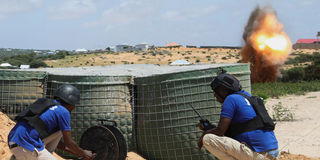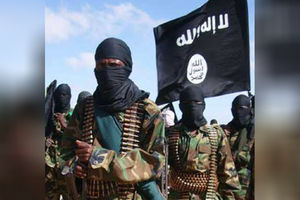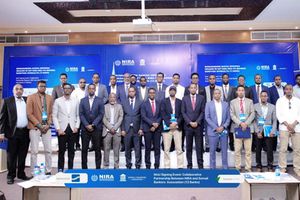
Somali police unit for Explosive Ordnance Disposal (EOD) detonates a controlled explosion of recovered mines on the outskirts of Mogadishu, Somalia May 27, 2024.
The story of al-Shabaab is 18 years old. But the proper war on this militant group began in July 2022. From there, President Hassan Sheikh Mohamud routinely appeared on the war front with troops, rallying the fight to go on. He said victory was in sight.
Then he reached out to volunteer vigilantes, known in the Somali language as Moawisley. These armed men were keen to protect their towns and villages from al-Shabaab control and leaned towards the government, even though they were just as armed.
A collaboration ensued against a common enemy and clashes between the clan militias and Al-Shabaab militants were often celebrated as a battle between Somalia and the enemy. Regional State Security Forces (SSF), working with the Somali National Army (SNA) would also enter battles against al-Shabaab, alongside vigilantes.
As months went by, it seemed President Mohamud had finally found out the weakness in al-Shabaab. A vast territory was reportedly liberated from the menace of the extremists enabling more visits to the battlefront by Somali President Hassan Sheikh Mohamud especially in central Somalia regions such as Dhusamareeb, in Galmuduug, about 510 km north of Mogadishu.
Soon, the name for al-Shabaab in Somalia was changed to Khawarij (followers of deviant Islamic sect). President Mohamud argued the militants should be equated with the good youth, which the word al-Shabaab means. That was phase 1 of the war.
But al-Shabaab was neither dead nor defeated. That lesson has returned heavily this year, offering the Somali forces a glimpse of just how hard it is to beat down an 18-year-old extremist group.
Then came merciless attacks. One was on Friday, August 9 on Mogadishu’s Lido Beach causing massive deaths and injuries.
Seven assailants targeted one of the prime eateries at the beachfront, Lido Beach View that attracts youths and tourists, including couples who want to relax on Fridays.
One disturbing footage was the brother of Saeed Kassim. Kassim perished in the attack on the same week he had a wedding. His wife too died in the attack.
Trying to hold tears back, the brother told the interviewer, “My brother’s wife was seriously injured by the initial blast triggered by an explosive-jacket-wearing bomber and later died in a hospital. My brother was heading towards the warm sea water to swim when the assailants showered him with 5 bullets on his back.”
Abdifatah Adan, the Spokesman of Somali Police Force Hassan said more than 30 people were killed instantly. He spoke as bodies lay on the beach where once life was its definition. “When the security forces neutralised the assailants, 32 individuals were found dead and twice as many injured,” said Hassan.
Lido Beach, the picturesque sandy beach, has been attacked many times before. But it is not the only one.
On July 14, a popular cafe, Top Coffee, crowded with football fans watching England take on Spain in the Euro 2024 final, was hit by a car bomb.
Located along Corso Somalia Avenue in Bondhere district in the city centre, the blast caused the death of 9 youngsters.
Al-Shabaab often attacks these joints because they detest youth who do not spend time in Jihad (Holy war), particularly when they play football or watch games in stadiums or even on screens.
Ali Mohammed Raghe alias Ali Dhere, the chief spokesman of Al-Shabaab, repeatedly said, “Football is an opium to young people, getting no rewards from spending precious time running after a round, inflated leather or plastic ball, instead of fighting for the message of Allah.”
Those attacks did not just poke holes in the security of the country. They may have as well poked holes in the confidence of fighting the group.
Some analysts think it is also a political problem, seeing Somalia face self-sabotage from some leaders who see irrelevance if al-Shabaab is beaten.
“Official claims that Al Shabaab is on the verge of defeat and surrender notwithstanding, the terror outfit has neither lost the capability to terrorise nor abandoned the motivation to violently topple the internationally recognised federal institutions of Somalia,”argued Dr Adam Aw Hirsi,a former government official now director of Foresight for Practical Solutions, a Mogadishu based public policy think-tank.
Al-Shabaab may lose many fighters in the field, or even withdraw from territory they have held for many years, he argued, but you can’t measure that as a win.
“It is measured by the intactness of their core viability, their determination to continue their violent mission, and how they are perceived by the communities they operate in,” Aw Hirsi told The EastAfrican on Monday, August 26.
In Somalia, two things have helped al-Shabaab survive the onslaught. One, Aw Hirsi explained, is the perception that the government was unable to fight back the controversial MoU signed between Ethiopia and the breakaway region of Somaliland, which Somalia considers part of its territory.
Signed in January, the MoU was to allow Ethiopia a 20km coastal strip to build a naval base in Somaliland in exchange for possible recognition of Somaliland. Mogadishu protested the move but Ethiopia has not formally withdrawn it.
Turkey recently gathered both sides for talks but they ended without a solution. Shabaabs have used this to rally recruits to defend their ‘land.’
“Additionally, al-Shabaab may have indirectly benefited from a generally antagonised, if not lethargic, Somali politicians and public that have been frustrated by the federal member state presidents who defied the long-held constitutional norms that required the office holders nationwide to allow elections every four years,” Dr Aw Hirsi explained.
In Somalia, where thousands of security forces are stationed, the extremists have had amble capacity to strike, further contradicting the official narrative that the ‘war on terror’ was about to be completed via a ‘second phase. The second phase was to start in March 2023 with local clan militias in Hiran region, Hirshabelle State, in central Somalia.
By mid-2023, it was already obvious that the pro-government forces could not firmly hold many liberated positions. Strategically important locations, which the government forces retreated from included El Dheer, Masagaway, Gal'ad and Budbud, all in Galgadud region.
Around that time, al-Shabaab militants struck a pre-dawn attack on a newly captured base in the village of Owsweyne. The government termed the move as defeatist, however.
“These are small strategic retreats,” the SNA said after an attack on two brigades stationed there.
Some vocal people were already raising their opinion on the setbacks, however. Former Somali President Sharif Sheikh Ahmed called for an investigation into how military operations at the Owsweyne frontline were handled.
President Mohamud promised that ‘faults’ shall be corrected, promising accountability while courage will be rewarded.
“It’s time to hold those abusing their responsibilities, committed treason or undermining the army accountable and to reward heroes among the soldiers,” Mohamud stressed, underlining that mistakes can be corrected.
For days and weeks since the attack on Owsweyne, which Al-Shabaab claimed to have neutralised 178 soldiers, some politicians have taken it as a pet subject.
Former Somalia presidents Mohamed Abdullahi Farmaajo and Sharif Sheikh Ahmed joined their voices to indicate weakness in the leadership of the Armed forces while President Mohamud was blamed for being busy manipulating the legislative to make changes to the constitution.
The epicentre of the controversy is the bicameral federal parliament sitting in Mogadishu to effect a series of amendments proposed by the Independent Constitutional Review and Implementation Commission with the suspected endorsement by Mohamud.
The former presidents argued that constitutional amendments without consensus divert attention from security needs. Former Prime Minister Hassan Ali Khayre, and former presidential candidate in 2022, Abdirahman Abdishakur, stress that the current administration is busying itself with non-priority issues.
Mohamud, however, tried to defend his move to liberate territories and amend the provisional constitution at the same time.
“When I was running for president, I promised to make every effort to review and implement the constitution,” said Mohamud, labelling ‘huge army setbacks’ as mere pessimism, mainly by disgruntled politicians.
Legislator Abdirizak Adan Warsame alias Husul, has criticised the government's strategy of supporting vigilantes.
“Moawisley are mainly composed of camel herders and are largely illiterate with no proper leadership,” he said in an interview, warning the government may not control the group once the war is over.
The lack of clarity on the status of security is even attracting researchers in the region. Balqiis, a non-partisan think-tank on the Horn of Africa, issued a worrying report.
“While the international community remains committed to supporting Somalia, it has not fully addressed the financial and logistical challenges required to maintain a robust security framework without the presence of a large-scale international mission,” Balqiis report said, referring to the transition after the AU forces leave Somalia in December. Somalia has since agreed to another regional force after the mandate of the African Union Transition Mission in Somalia (ATMIS) is over.







